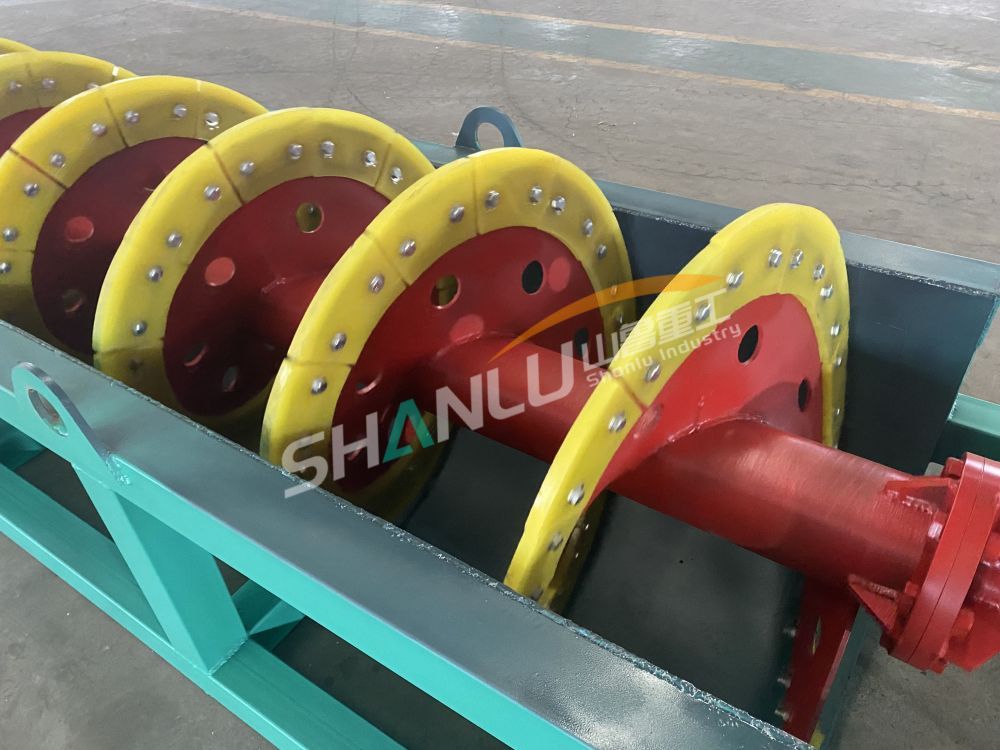The spiral sand washing machine is the key equipment for quartz sand
desliming and purification. If the ore washing is incomplete (the mud content of
finished product is over 3%) and the fine sand loss is large (the loss rate of
fine sand<0.15mm is over 10%), the raw material will be wasted and the
quality of finished product will not meet the standard. Combined with practical
experience, the three-step troubleshooting method is summarized to quickly
recover equipment performance.

Step 1: Inspect the spiral and water tank structure - the core component
determines the ore washing effect
Unreasonable design of spiral blade and water tank is the main reason for
poor cleaning and sand running.
Worn or wrong angle of spiral blade: the blade edge is worn (the thickness is
reduced by more than 1/3), the stirring material strength is reduced, and the
clay is difficult to be stripped; Blade angle deviation (standard 15 ° - 20 °),
too large angle will bring fine sand, and too small angle will lead to
insufficient ore washing time. The high-chrome alloy blade shall be replaced and
calibrated with an angle ruler during installation to ensure that each blade has
the same angle.
Improper water level and overflow port of the water tank: the water level is
lower than 1/2 of the spiral shaft, the materials are not fully soaked, and the
clay is difficult to be softened; If the water level is too high, fine sand will
be lost with overflow water; Too low overflow port will accelerate loss of fine
sand. The inlet valve shall be adjusted to control the water level at 2/3 of the
screw shaft. The overflow port shall be 30-50cm higher than the bottom of the
water tank to reduce the loss of fine sand.
Step 2: Calibrate operating parameters - parameter deviation aggravation
problem
Improper spiral rotation speed and feeding amount directly affect ore washing
efficiency and fine sand retention.
Rotating speed is too fast or too slow: rotating speed is over 25r/min, water
flow is too strong, and fine sand is easy to be washed away; If it is lower than
15r/min, the ore washing time is insufficient and the silt content exceeds the
standard. Detect with tachometer, and adjust according to the particle size. Set
18-22r/min for coarse sand (1-5mm) and 15-18r/min for fine sand (0.15-1mm).
Overload or uneven feeding capacity: over rated handling capacity (e.g. rated
60t/h, actual 80t/h), material accumulation in the water tank and incomplete ore
washing; The feeding varies from time to time, the water level fluctuates
greatly and the loss of fine sand is unstable. Electronic belt weigher shall be
used to control the quantity and keep it at 80% - 90% of the rated value.
Vibrating feeder shall be installed to realize uniform feeding.
Step 3: Adaptable materials and routine maintenance - raw material
problems+maintenance missing
Improper material characteristics and maintenance will magnify equipment
problems.
Material with high mud content or strong viscosity: when the mud content
exceeds 15% and the clay has large viscosity, it is easy to agglomerate and
adhere to the spiral, and the water tank is not cleaned and blocked.
Pre-screening is required prior to ore washing to remove bulk clay, or 0.1% -
0.3% dispersant (such as sodium hexametaphosphate) is added to the water tank to
reduce clay viscosity.
Lack of equipment maintenance: too much mud (over 10cm) at the bottom of the
water tank, affecting the water flow circulation; Unstable screw speed caused by
bearing oil shortage. Clean the accumulated mud in the water tank every day,
check the bearing every week and add lithium base grease, check the blade wear
every month and replace the vulnerable parts in time.
The above three steps can control the mud content of spiral sand washer
within 1%, and the loss rate of fine sand can be reduced to below 5%. If there
are still problems, it is suggested to contact the manufacturer to test the
adaptability of the equipment to ensure that it matches the production
requirements.